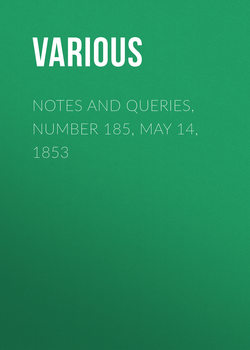Читать книгу Notes and Queries, Number 185, May 14, 1853 - Various - Страница 6
Notes
A SHAKSPERIAN BOOK
Оглавление"There exists," says Mr. John Wilson, "as it were a talismanic influence in regard to the most trivial circumstances connected with Shakspeare," and yet this enthusiast has not, in his Shaksperiana, alluded to the dramatic works of Mary Hornby, written under, and dated from, the dear old roof at Stratford-upon-Avon!
It was my late good fortune, after filling my pockets from the twopenny boxes of the suburban bookstalls, to find, on turning out the heterogeneous contents, that I had accidentally become possessed of The Broken Vow, a comedy by the aforesaid lady, who waits to be enrolled in that much wanted book, a new edition of the Biographia Dramatica. This Broken Bow which looks like a re-cooking of the Merry Miller of Thomas Sadler, 1766, bears to be "printed at Stratford-upon-Avon, for the Author, by W. Barnacle, 1820." Mary Hornby, following the example of the preoccupier of the butcher's shop, tries her hand at both tragedy and comedy; in the first line she stands charged with the perpetration of The Battle of Waterloo, which, I doubt not, rivalled its original enactment in its sanguinary character. I have not been lucky enough to fall in with this, which was a hit; our fair authoress, in her preface to the comedy under notice, modestly attributing its great success more to the kindness of her friends than to its literary merit.
Mrs. Hornby sustains the dignity of the drama by adhering to her five acts, with prologue and epilogue according to prescription. Looking to the prologue for the who, the why, and the wherefore, I am sorry to say I find no materials for the concoction of a biographical note; upon the second point, the why, she tells us:
"When women teem, be it with bad or good,
They must bring forth—forsooth 'tis right they should,
But to produce a bantling of the brain,
Hard is the task, and oft the labour vain."
That her literary accouchement should not be a failure, she further says:
"Lord, how I've bother'd all the gods and graces,
Who patronize some mortals, in such cases."
I take the expressive use of the word "some" here to indicate her predecessor, the ancient occupier of the tenement, who certainly was a protégé of the said parties.
Mrs. Hornby then goes on to relate how that during her gestation she invoked Apollo, Thalia, and Erato:
"Soon they arrived, with Hermes at their side,
By Jove commission'd, as their friend and guide.
But when the mirth-inspiring dames stepp'd o'er
The sacred threshold of great Shakspeare's door,
The heav'nly guests, who came to laugh with me,
Oppress'd with grief, wept with Melpomene;
Bow'd pensive o'er the Bard of Nature's tomb,
Dropt a sad tear, then left me to my doom!"
I leave the reader to judge for himself whether the Muses really "came to laugh" with Mary Hornby, or whether, under the belief of the immortality of our Bard, they did not rather expect a pleasant soirée with Gentle Will, and naturally enough went off in a huff when they found themselves inveigled into a tea-party at Mrs. Hornby's.
Mr. Wilson, in the work above quoted, does condescend to notice Mrs. Hornby,—
"Who rented the butcher's shop under the chamber in which the poet was born, and kept the Shaksperian Album, an interesting record of the visitors to that shrine. Some of the subscribers having given vent to original stanzas suggested by the scene, those effusions," continues the lofty bookseller, "the female in question caused to be inscribed and printed in a small pamphlet, which she sells to strangers."
Not a word, you will see, about the poet's mantle having descended upon the shoulders of our Mary,—which was unpolite of him, seeing that both the tragedy and comedy had the precedence of his book by some years. Not having before me the later history of Shakspeare's house, I am unable to say whether our subject deserved more consideration and gallant treatment at the hands of Mr. Collier, when he and his colleagues came into possession.
J. O.
